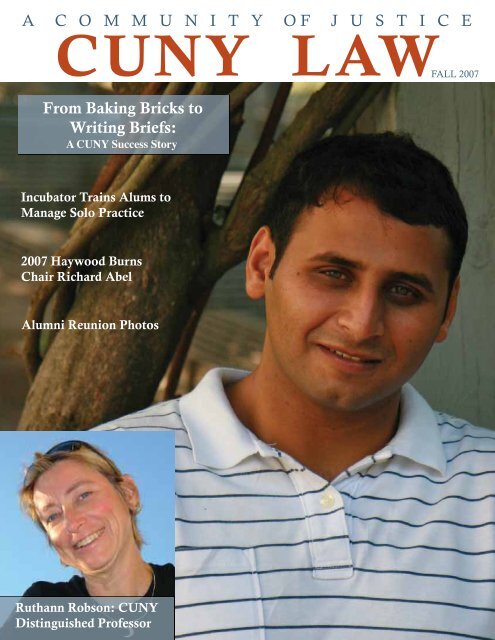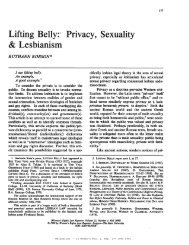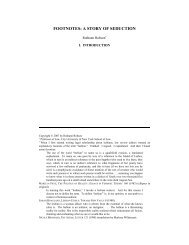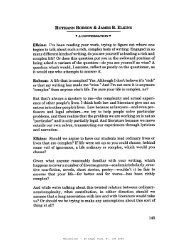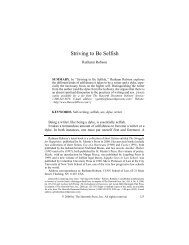A profile by Emily Sachar - Ruthann Robson
A profile by Emily Sachar - Ruthann Robson
A profile by Emily Sachar - Ruthann Robson
You also want an ePaper? Increase the reach of your titles
YUMPU automatically turns print PDFs into web optimized ePapers that Google loves.
A C O M M U N I T Y O F J U S T I C E<br />
CUNY LAWFALL<br />
From Baking Bricks to<br />
Writing Briefs:<br />
A CUNY Success Story<br />
2007<br />
Incubator Trains Alums to<br />
Manage Solo Practice<br />
2007 Haywood Burns<br />
Chair Richard Abel<br />
Alumni Reunion Photos<br />
<strong>Ruthann</strong> <strong>Robson</strong>: CUNY<br />
Distinguished Professor
FEATURE<br />
10<br />
<strong>Ruthann</strong> <strong>Robson</strong>:<br />
CUNY Law’s New Distinguished Professor<br />
An Illinois lesbian had been sentenced<br />
to die for murder. The prosecution argument:<br />
the woman was a ruthless manhater<br />
who had lured the victim home<br />
from a bar with the explicit purpose of<br />
killing him. <strong>Ruthann</strong> <strong>Robson</strong>, professor<br />
of law, was working in her office<br />
overlooking the gardens of CUNY Law<br />
School in 2002 when an alumna, Joey<br />
<strong>Robson</strong> enjoys a light moment.<br />
Mogul (Class of ’87), working at the<br />
People’s Law Office in Chicago, phoned<br />
seeking her help. Would the law professor<br />
write an affidavit arguing that prosecutorial<br />
bias contributed to the defendant’s<br />
conviction? Of course, <strong>Robson</strong> replied.<br />
“The issue wasn’t whether the woman<br />
committed the killing,” the professor in<br />
queer legal theory said in a recent interview<br />
with CUNY Law. “Rather, the point<br />
was to prove that the theory of the prosecution<br />
was wrong. There were many<br />
other factors involved in the killing that<br />
had not been brought to light at trial.<br />
Homophobia absolutely contributed<br />
to a woman being sentenced to death.”<br />
A Summer Honor<br />
Now, <strong>Robson</strong>, 51, is in the limelight<br />
following the summer 2007 announcement<br />
that she<br />
has been named<br />
University Distinguished<br />
Professor<br />
<strong>by</strong> the CUNY<br />
Board of Trustees.<br />
<strong>Robson</strong> thus<br />
becomes the only<br />
Law School faculty<br />
member to hold<br />
the designation.<br />
“It feels great<br />
to have my work<br />
recognized in<br />
this way, and it’s<br />
so important for<br />
the Law School<br />
because we had no<br />
one on the faculty<br />
with the designation,<br />
and yet we<br />
have so many<br />
people here doing<br />
work worthy of<br />
it,” <strong>Robson</strong> said.<br />
“Also it has always<br />
meant a great deal<br />
to me that CUNY<br />
has never said:<br />
Photo <strong>by</strong> Chris Rottler ‘Don’t do this sort<br />
of writing and<br />
research; it’s too<br />
risky.’ The word on the street used to be:<br />
‘Don’t mention sexuality until you get<br />
tenure.’ That turns out to be wrong.”<br />
In fact, <strong>Robson</strong> sought early tenure<br />
based on lesbian legal scholarship. She<br />
earned tenure at CUNY in 1993, three<br />
years after her arrival to the Law School,<br />
having just received her LL.M. from<br />
the University of California at Berkeley<br />
By <strong>Emily</strong> <strong>Sachar</strong><br />
(Boalt Hall) and done the seminal work<br />
for (Out)Law, a scholarly work that addresses<br />
legal implications for lesbians on<br />
everything from crimes of lesbian sex to<br />
immigration and lesbian legal workers.<br />
Law School Dean Michelle J. Anderson<br />
concurs in noting the importance<br />
of <strong>Robson</strong>’s new designation. “<strong>Ruthann</strong><br />
has always engaged in ground-breaking<br />
work,” Anderson said. “Having the<br />
Board of Trustees recognize her brilliance<br />
and the importance of her scholarly<br />
contributions <strong>by</strong> designating her a Distinguished<br />
University Professor is a gold<br />
star for both her and for the Law School.”<br />
The designation, adds Associate Dean<br />
Mary Lu Bilek, who has known <strong>Robson</strong><br />
for her full tenure at CUNY Law,<br />
has meaning to the world-at-large and<br />
to CUNY Law internally. “It’s recognition<br />
from the University that <strong>Ruthann</strong> is<br />
a scholar with a national reputation. We<br />
knew <strong>Ruthann</strong> was forging new paths and<br />
creating a whole new area of scholarship.<br />
It was clear that she was the national<br />
leader in doing so and that her scholarship<br />
was changing the way other scholars<br />
thought and talked about the law and<br />
also was helping others to change the law<br />
to promote social justice, especially for<br />
the LGBT community. Internally, what<br />
is especially meaningful to us,” Bilek<br />
added, “is that <strong>Ruthann</strong> is the consummate<br />
professor and colleague, and the<br />
University has recognized that, as well.”<br />
Law and Literature<br />
In fact, for nearly 20 years, <strong>Robson</strong><br />
has made queer law, the interpretation<br />
and study of law as it pertains to lesbians,<br />
gay men, and other sexual minorities, the<br />
centerpiece of her scholarship. In addition,<br />
she is a fiction writer who has published<br />
two novels and three works of short<br />
fiction, most with lesbian themes. One<br />
of her books, Cecile, is assigned in many<br />
women’s literature courses. She also is a<br />
poet with yet another book, Masks, to her<br />
credit; it was named one of the best poetry<br />
books of 1999 <strong>by</strong> Library Journal. And<br />
she was named a 2007 Fellow in Nonfic-<br />
www.law.cuny.edu
tion Literature <strong>by</strong> the New York Foundation<br />
for the Arts. Her legal publications,<br />
in law journals, anthologies, periodicals,<br />
and encyclopedias, number nearly 100<br />
and include three non-fiction books.<br />
Law and literature? “For me, they<br />
both come from this place of wanting<br />
social change and wanting to affect<br />
the way people move the social<br />
justice agenda forward,” <strong>Robson</strong> says.<br />
<strong>Robson</strong> also has used difficult life<br />
experiences as inspiration for writing.<br />
In “Notes from a Difficult Case,” <strong>Robson</strong><br />
wrote an award-winning essay about<br />
her experience facing liposarcoma, a<br />
rare cancer of the tissues. “What for me<br />
is especially striking in ‘Notes’ is <strong>Ruthann</strong>’s<br />
honesty in registering her frustration<br />
with the formal terms of law and<br />
medicine, which are neither graceful,<br />
supple, nor humane, and her willingness<br />
to translate those terms into language<br />
that is more resonant and resilient,”<br />
says Professor Andrea McArdle,<br />
director of legal writing at CUNY Law.<br />
Love of Teaching<br />
While reticent to speak of her own<br />
family relationships, <strong>Robson</strong> talks openly<br />
of her current and former students, her<br />
grading philosophy, and her role as founding<br />
co-adviser in 1995 of The New York<br />
City Law Review, CUNY Law’s legal journal,<br />
devoted to the CUNY Law mission<br />
of social justice. The volumes of every<br />
edition since its inception share a prominent<br />
shelf in <strong>Robson</strong>’s light-drenched<br />
office with a bottle of sea salt, an old<br />
copy of Black’s Law Dictionary and<br />
copies of dozens of publications written<br />
<strong>by</strong> members of the Law School faculty.<br />
In fact, faculty have been <strong>Robson</strong>’s<br />
students, too, as she has been instrumental<br />
in establishing mentoring programs<br />
to enhance their opportunities for published<br />
scholarship. “She’s as concerned<br />
with others as she is with herself,” says<br />
Professor Shirley Lung, who teaches<br />
a variety of courses at CUNY Law.<br />
“She’s been very generous with her time<br />
and experience, giving wonderful guidance<br />
to others in getting an article conceived<br />
and going through the journal<br />
and publication submission process.”<br />
<strong>Robson</strong>’s current and former students<br />
say they are deeply moved <strong>by</strong> her designation<br />
as Distinguished Professor. Mogul,<br />
the Chicago civil rights and capital<br />
defense attorney who turned to <strong>Robson</strong><br />
when she was defending lesbian defendant<br />
Bernina Mata, said in a phone<br />
interview that she remembers well her<br />
time studying under <strong>Robson</strong>. “<strong>Ruthann</strong><br />
has profoundly affected both my legal<br />
work and my work for justice,” Mogul<br />
said. “She is an inspirational professor<br />
and an inspirational theorist who has<br />
blazed a path for advocating on behalf<br />
of lesbian, gay and queer individuals.”<br />
For her part, <strong>Robson</strong> says mentoring<br />
others is one of the most rewarding parts<br />
of her work. “With teaching, you assist<br />
people, as you would assist clients, and<br />
you also watch people grow,” she says.<br />
“We have so many alums out there doing<br />
great work, the sort of work I would do.<br />
In fact, if I had 100 lives, I would like to<br />
do many of the things our students do.”<br />
New Goals<br />
As a new distinguished professor,<br />
<strong>Robson</strong> says she has two pressing agenda<br />
items. One is to organize an event<br />
or discussion each semester at the Law<br />
School with faculty and two distinguished<br />
professors from other fields outside<br />
the School hooked to a particular<br />
class topic. The first event will be held<br />
in early November and be devoted to a<br />
conversation about poverty and class.<br />
Second on her list of to-dos is to work<br />
within CUNY to better understand the<br />
standards to earn the distinguished professor<br />
designation and to work to get<br />
more Law School colleagues designated.<br />
As to her own work, <strong>Robson</strong> says she<br />
is always looking to write about subjects<br />
about which she can’t find sufficient information<br />
to read. And she says she’ll continue<br />
to ponder the headline issues of the<br />
day. Should gay marriage, for instance,<br />
continue to dominate the queer agenda?<br />
“In the law, there are always new<br />
things that shake things up, that shake me<br />
up, that make me wonder,” <strong>Robson</strong> says.<br />
“I can’t envision that I’ll ever be bored.”<br />
On the contrary, she merely wishes, she<br />
says, for one more of those 100 lives.<br />
For more about <strong>Ruthann</strong> <strong>Robson</strong>, visit<br />
her Web site: www.ruthannrobson.com<br />
<strong>Robson</strong> Joins Elite Cadre of<br />
Distinguished Professors<br />
<strong>Ruthann</strong> <strong>Robson</strong> joins 130 other distinguished professors<br />
among the 6,100 full-time teaching faculty at the City<br />
University of New York. That puts her among just 2 percent<br />
of her colleagues. She was one of seven who received the<br />
designation <strong>by</strong> the Board of Trustees in June 2007. Eight<br />
individuals were nominated.<br />
<strong>Robson</strong> is the only professor at the Law School to hold<br />
the accolade currently. However, early in the Law School’s<br />
history, Howard Lesnick, one of the School’s founders, had<br />
been named a distinguished professor.<br />
A CUNY Distinguished Professor is an exceptional<br />
scholar with an international reputation for scholarly and/or<br />
research excellence, according to Executive Vice Chancellor<br />
and University Provost Selma Botman.<br />
The number of Distinguished Professors is limited to<br />
175 across the University under the terms of the collective<br />
bargaining agreement with the Professional Staff Congress,<br />
the labor union that represents more than 20,000 CUNY<br />
faculty and staff.<br />
For more information on CUNY’s Distinguished Professor<br />
program, visit: www.cuny.edu/dp<br />
-<strong>Emily</strong> <strong>Sachar</strong><br />
www.law.cuny.edu 11


